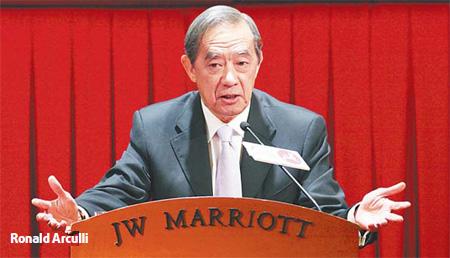
Financial markets face a "systemic risk" because of the lack of transparency in new trading systems such as dark pools, according to Hong Kong Exchanges & Clearing Ltd Chairman Ronald Arculli.
"The opaqueness has negative implications for corporate governance," Arculli, 70, said during a speech at the Foreign Correspondents' Club in Hong Kong on Wednesday. The platforms "increase price volatility and may add to surveillance difficulties".
Singapore Exchange Ltd and Chi-X Global Inc agreed in August to establish Asia's first exchange-backed dark pool, a type of equity network that doesn't display public quotes. Operators of alternative trading platforms such as Liquidnet Holdings Inc say they allow institutional investors to buy and sell stock without causing price swings.
Exchanges worldwide have been building systems in response to competition from alternative trading platforms among fund managers seeking to trade anonymously with lower transaction costs. Loss of market share dragged London Stock Exchange Group Plc's (LSE) profit in the six months ended Sept 30 down by 40 percent, according to company data.
The LSE is seeking to buy Turquoise, the trading system created by its biggest customers as an alternative to stock exchanges.
Retail investors
The portion of trades handled off public exchanges in the Asia-Pacific region is forecast to rise to 20 percent by the end of 2012 from near zero in 2008, research firm Aite Group LLC said in June. Individual investors may be the biggest losers as fund managers increasingly turn to alternative trading platforms, Arculli said.
"This in effect creates a two-tier market," Arculli said. "The playing field is no longer level. The public, the retail investor, may not have access to the best prices."
Lee Porter, managing director of New York-based Liquidnet's Asia-Pacific business, said alternative trading platforms allow professionals to trade "without fear of market impact or information leakage".
"Both affect price of their executions and returns, which are ultimately passed on to retail investors through their pension and mutual funds," said Porter, who was in the audience at the FCC. He made the comments by e-mail following Arculli's speech.
Singapore dark pool
Liquidnet offered its services to more than 590 firms as of the end of September, a company brochure said. The average size of trades handled by the company's Asia-Pacific business in the three months to Sept 30 was $1.22 million, the brochure said. The average securities trade on the Hong Kong stock exchange this year to September was HK$87,457 ($11,284), bourse data show.
Singapore Exchange's dark pool venture with Chi-X is due to start operations next year. The platform chose LCH.Clearnet Group Ltd, Europe's largest clearing house, to process trades in Hong Kong, Japanese and Australian securities.
Dark pools processed 1.2 percent of Japan's stock transactions in 2008, according to market researcher Tabb Group LLC. The total will rise to 3.5 percent by 2010, Tabb said. That compares with an estimated share of 7 percent in major European markets next year from the current level of 4.1 percent, according to Tabb.
"We can't afford to ignore the issues that arise" from the alternative trading platforms, Arculli said. "We in Hong Kong continue to work with regulators and our exchange counterparts to monitor and tackle these issues."





